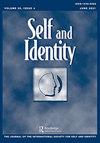Reducing prejudice by enhancing the other rather than the self
IF 2.1
4区 心理学
Q3 PSYCHOLOGY, SOCIAL
引用次数: 1
Abstract
ABSTRACT Self-enhancement may exacerbate ingroup favoritism. What if, rather than self-enhancement, individuals focused on enhancing others? Could this reduce prejudice? Three studies tested the impact of self-enhancement versus ‘other-enhancement’ on prejudice. In Study 1 (N=95), a repeated measures design showed that participants demonstrated less implicit bias after reflecting on another person’s positive traits relative to their own. In Study 2 (N=169), participants who reflected on an outgroup strength showed less racism than those who reflected on an ingroup strength and those in a comparison condition. In Study 3 (N=380), other-enhancement negatively linked to racism and sexism, whereas self-enhancement did not. Additionally, Study 3 examined an antecedent of other-enhancement – humility. We discuss the importance of enhancing others in reducing prejudice.通过提升他人而不是自我来减少偏见
自我提升可能加剧群体内偏袒。如果人们关注的不是自我提升,而是提升他人呢?这能减少偏见吗?三项研究测试了自我提升与“他人提升”对偏见的影响。在研究1 (N=95)中,重复测量设计表明,参与者在反思他人的积极特质后,相对于自己的积极特质,表现出更少的内隐偏见。在研究2 (N=169)中,反思外群体力量的参与者比反思内群体力量的参与者和处于比较条件下的参与者表现出更少的种族主义。在研究3 (N=380)中,他人增强与种族主义和性别歧视呈负相关,而自我增强与此无关。此外,研究3检验了他人增强的前例——谦卑。我们讨论了增强他人对减少偏见的重要性。
本文章由计算机程序翻译,如有差异,请以英文原文为准。
求助全文
约1分钟内获得全文
求助全文
来源期刊

Self and Identity
PSYCHOLOGY, SOCIAL-
CiteScore
5.10
自引率
5.00%
发文量
26
期刊介绍:
Work on self and identity has a special place in the study of human nature, as self-concerns are arguably at the center of individuals" striving for well-being and for making sense of one"s life. Life goals develop and are influenced by one"s view of what one is like, the way one would ideally like to be (or would like to avoid being), as well as one"s perceptions of what is feasible. Furthermore, conceptions of self and the world affect how one"s progress towards these goals is monitored, evaluated, redirected, re-evaluated, and pursued again. Thus, the “self” as a construct has far-reaching implications for behavior, self-esteem, motivation, experience of emotions and the world more broadly, and hence for interpersonal relationships, society, and culture.
 求助内容:
求助内容: 应助结果提醒方式:
应助结果提醒方式:


